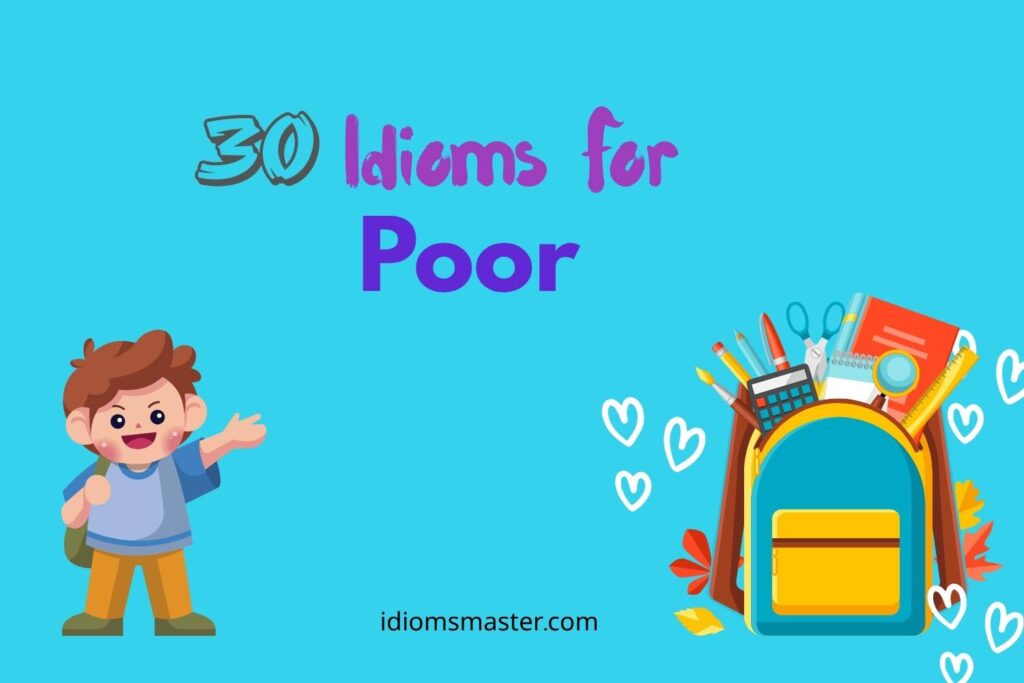Sometimes, people don’t have a lot of money to buy things they need. Instead of saying “poor” every time, people use special phrases called idioms. These idioms help show what it feels like to be poor in a more interesting way. Writers and speakers often use them to explain struggles, challenges, or real-life situations.
In poems, stories, or even everyday talk, idioms for being poor make the meaning stronger. They help the listener understand what someone is going through without saying it directly. These phrases can be funny, honest, or full of feeling. Let’s learn some of the most common idioms people use to talk about being poor.
Idioms for Poor
1. Down and out
Meaning: Having no money or home.
Samples: After losing his job, he was down and out for a while. / She helped a down and out man on the street.
To Put it Another Way: He had nothing. / She was living with no money or place to stay.
2. Flat broke
Meaning: Having no money at all.
Samples: I was flat broke after paying all my bills. / He couldn’t buy lunch because he was flat broke.
To Put it Another Way: I had zero dollars. / He had no money in his pocket.
3. Not a penny to your name
Meaning: Completely out of money.
Samples: He didn’t have a penny to his name after the move. / She lived with not a penny to her name during college.
To Put it Another Way: She had nothing left. / He was totally broke.
4. Scraping by
Meaning: Barely managing to survive with little money.
Samples: They were scraping by on a small paycheck. / We scraped by last month after all the bills.
To Put it Another Way: They just had enough. / We barely made it.
5. Live hand to mouth
Meaning: Living with just enough money for each day.
Samples: Many families live hand to mouth and can’t save. / He lived hand to mouth while looking for work.
To Put it Another Way: No money is left over. / Just enough for today.
6. Without a dime
Meaning: Totally broke.
Samples: He walked out of the store without a dime. / After the trip, she was without a dime.
To Put it Another Way: He had no money at all. / She was completely out of cash.
7. Dirt poor
Meaning: Extremely poor.
Samples: They were dirt poor when they first moved here. / That family was dirt poor but full of love.
To Put it Another Way: They had almost nothing. / Very, very poor.
8. Broke as a joke
Meaning: Very poor, often used humorously.
Samples: I’m broke as a joke after that vacation. / He laughed, saying he was broke as a joke.
To Put it Another Way: I have no money and it’s kind of funny. / He’s super broke.
9. Not have two nickels to rub together
Meaning: Very poor with no money at all.
Samples: We didn’t have two nickels to rub together in college. / He joked that he didn’t have two nickels to rub together.
To Put it Another Way: We were completely broke. / He had no cash at all.
10. On a shoestring budget
Meaning: Living with very little money.
Samples: They ran the event on a shoestring budget. / I decorated my room on a shoestring budget.
To Put it Another Way: We spent only a little. / Had very little money to use.
11. Paycheck to paycheck
Meaning: Using all your money before the next payday.
Samples: We’re living paycheck to paycheck right now. / Most of his money is gone before the next paycheck.
To Put it Another Way: Just enough to make it each month. / Nothing extra left.
12. Down to your last dollar
Meaning: Almost out of money.
Samples: I was down to my last dollar before payday. / She had only one dollar left—down to her last.
To Put it Another Way: Nearly broke. / Only one dollar left.
13. Running on empty
Meaning: Having no money or energy left.
Samples: After the bills, I’m running on empty. / He’s running on empty both in money and energy.
To Put it Another Way: I have nothing left. / He’s tired and broke.
14. Tighten your belt
Meaning: Spend less money.
Samples: We had to tighten our belts after Dad lost his job. / Let’s tighten our belts until next month.
To Put it Another Way: Spend less. / Be careful with money.
15. Living in poverty
Meaning: Living with very little money or resources.
Samples: Many kids grow up living in poverty. / She writes poems about living in poverty.
To Put it Another Way: Having a hard life with little money. / Poor conditions.
16. In the red
Meaning: Owing more money than you have.
Samples: My bank account is in the red again. / The school was in the red last year.
To Put it Another Way: I owe money. / We’re behind on payments.
17. Pockets turned inside out
Meaning: Showing that you have no money.
Samples: I checked my pockets—turned inside out and empty. / His pockets were turned inside out after lunch.
To Put it Another Way: He had nothing left. / I was completely broke.
18. Living on crumbs
Meaning: Surviving on very little.
Samples: After losing his job, he was living on crumbs. / They lived on crumbs during hard times.
To Put it Another Way: Barely getting by. / Very little to eat or use.
19. Can’t make ends meet
Meaning: Can’t pay for everything needed.
Samples: We can’t make ends meet this month. / She works two jobs and still can’t make ends meet.
To Put it Another Way: Our money isn’t enough. / Struggling to cover bills.
20. In hard times
Meaning: Going through a period of poverty or struggle.
Samples: The town is in hard times after the factory closed. / We lived through hard times last year.
To Put it Another Way: Life is tough now. / Struggling with money.
21. Living off scraps
Meaning: Surviving with very little food or money.
Samples: They were living off scraps after the storm. / His poem was about kids living off scraps.
To Put it Another Way: They had very little to live on. / Almost nothing left.
22. Rags to rags
Meaning: Staying poor or becoming poor again.
Samples: It was a rags to rags story, not a happy one. / He went from rich to rags to rags.
To Put it Another Way: He stayed poor. / Never got better.
23. A thin wallet
Meaning: Not much money to spend.
Samples: My thin wallet said no to new shoes. / He had a thin wallet all month.
To Put it Another Way: I had little cash. / He couldn’t buy much.
24. A poor man’s meal
Meaning: A cheap or simple meal.
Samples: Beans and bread were a poor man’s meal. / He cooked a poor man’s meal for dinner.
To Put it Another Way: Cheap food. / Very basic meal.
25. On welfare
Meaning: Getting help from the government due to poverty.
Samples: The family was on welfare after the job loss. / She got food from welfare programs.
To Put it Another Way: They received help because they were poor. / Needed support.
26. Cash-strapped
Meaning: Having little money available.
Samples: We were cash-strapped and had to skip vacation. / She was cash-strapped this season.
To Put it Another Way: Not enough money to spend. / Very limited cash.
27. Living on borrowed time
Meaning: Living in a risky situation that can’t last.
Samples: Their savings were gone—they were living on borrowed time. / I felt like we were living on borrowed time.
To Put it Another Way: Things won’t last. / We’re almost out of time and money.
28. From hand to mouth
Meaning: Living with just enough for each day.
Samples: They lived from hand to mouth with no savings. / Many families are still living hand to mouth.
To Put it Another Way: Only enough for today. / No money saved.
29. Pennies to rub
Meaning: Having only a small amount of money.
Samples: I had just a few pennies to rub together after rent. / His story was about life with just pennies to rub.
To Put it Another Way: Very poor. / Only had a few coins.
30. Go bust
Meaning: To run out of money or go broke.
Samples: Their small shop went bust last year. / He went bust trying to start a business.
To Put it Another Way: Out of business and money. / It failed due to lack of cash.
Find the Topics: Idioms for Poor
Activity: “Saving for the Field Trip”
The fifth-grade class was excited about the field trip to the science museum. Everyone wanted to go, but not all families could afford it.
Carlos looked at his mom and said, “We’re kind of cash-strapped, right?” She nodded, “Yes, we’re living paycheck to paycheck, but we’ll find a way.”
Later that night, Carlos wrote a poem about how he felt. “We’re scraping by, but I still dream big,” he wrote. “Our wallets are thin, but our hearts are full.”
At school, Mia told him, “We’re down to our last dollar, too. My dad said we need to tighten our belts this month.”
During recess, Jamal said, “My family’s on a shoestring budget. We’re trying, but I might not go.” Ms. Taylor heard him and smiled, “We’ll make sure no one is left out.”
After school, Carlos shared his poem at writing club. He ended with, “Even when you’re flat broke, you can still dream.” The class clapped.
Your Task:
Underline or list the 8 idioms for poor used in the story.
Answer Key
- Cash-strapped
- Living paycheck to paycheck
- Scraping by
- Thin wallet
- Down to our last dollar
- Tighten our belts
- On a shoestring budget
- Flat broke
Conclusion
Idioms help us talk about tough times in a way that others can feel and understand. Instead of saying “poor” over and over, we can use these expressions to show what life is really like.
Using idioms for poor in writing or poetry makes the message more powerful. It helps us explain the truth without needing many words. Try using some of these idioms in your next story or poem to help others see what you feel.




